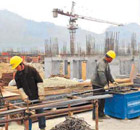-
-
China Daily E-paper
Highlights
China's transition challenges
(chinadaily.com.cn)
Updated: 2010-01-28 15:14
 |
Large Medium Small |
China is facing a major transition period after decades' of development, said Michael Spence, the 2001 Nobel Laureate in Economics in his latest article China's Next Mountain to Climb.
The world’s most populous country, which is widely expected to surpass Japan to become the second largest economy in the world, has successfully survived the global financial and economic crisis, but will still face a tough future, said Spence, who is also a Professor Emeritus at Stanford University.
Spence believed that the important parts of China's economy are already, or are entering, middle-income status with a per capita income of around US$4,000, a watershed during which many countries have lost momentum as structural transformations stall.
| ||||
Most importantly, the rapid growth of the domestic market, especially the service sector, needs to largely replace the export sector as the employment engine pulling the rural population into the modern economy, he suggested.
Spence also talked about China's growing social tensions resulting from a flock of rural workers into the cities and their constrained rights and access to services. China is solving the problem by expanding provision of rural services, increasing investment in urban infrastructure and service provision, and regularizing migrants’ status.
Another challenge Spence said China must face up to is an external environment that is occasionally hostile to the country’s form of government, that sometimes overlooks or undervalues the rapid rise of millions of Chinese from poverty; that tends to view the global economy as a zero-sum game; and that mistakenly attributes China’s economic success to non-cooperative policies in areas like exchange-rate management.
In addition, China has to assume greater responsibility for global imbalances, economic and financial stability, and governance, as well as represent the interests of less powerful developing countries, according to him.













